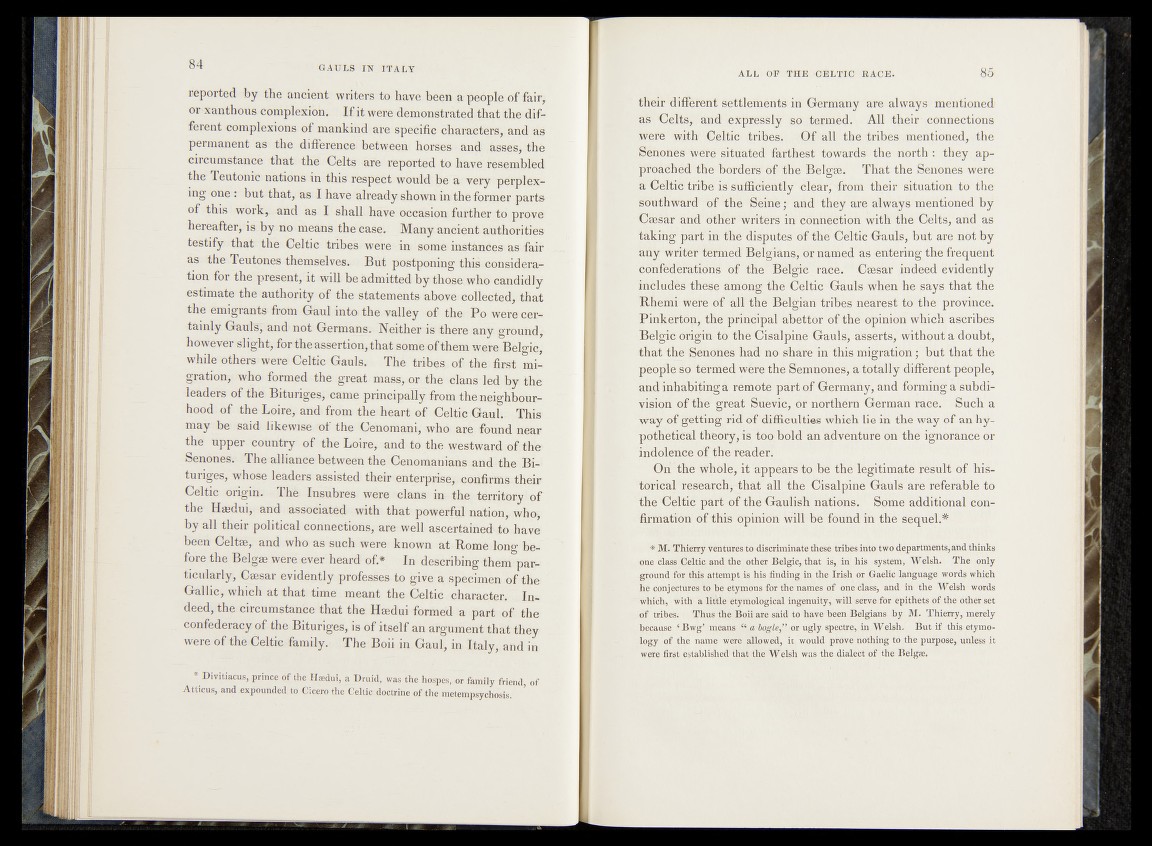
reported by the ancient writers to have been a people of fair,
or xanthous complexion. K it were demonstrated that the different
complexions of mankind are specific characters, and as
permanent as the difference between horses and asses, the
circumstance that the Celts are reported to have resembled
the Teutonic nations in this.respect would be à: very perplexing
one : but that, as I have already, shown in the former parts
of this work, and as I shall have occasion further to prove
hereafter, is by no means the case. Many ancient authorities
testify that the Celtic tribes were in some instances as fair
as the Teutones themselves. But postponing this consideration
for the present, it will be admitted by those,who candidly
estimate the authority of the statements above collected, that
the emigrants from Gaul into the valley of the Po were certainly
Gauls, and not Germans. Neither:is there any. ground,
however slight, forthe assertion, that some of them were Belgic,
while others were Celtic Gauls. Thé trib e s oft the first migration,
who formed the great mass, or the clans led by the
leaders of the Biturigesf came principally from -themeighbour-
hood of the Loire, and from the heart of Celtic Gaul. This
may be said likewise of the Cenomani, who are found near
the upper country of the Loire, and to the westward of the*
Scnones. The alliance between the Cenomanians and the Bi-
turiges, whose leaders assisted their enterprise, confirms their
Celtic origin. The Insubres were clans in the territory of
the llædui, and associated with that powerful nation, who-,
by all their political connections, are well asc e rta in ed ^ have
been Geltae, and who as such were known at Rome long be-
fore the Belgæ were ever heard of.* In describing them particularly5,
Cæsar evidently professes to give a specimen of the
Gallic, which at that time meant the Celtic. character. Indeed,
the; circumstance that the Haedui formed a parts of the
confederacy of the Bituriges, is of itself an argument that they
were of the Celtic family. The Boii in Gaul, in Italy, and in
* Divitiacus, prince of the Haedui, a Braid, was the hospes, .or-family friend, of
Atticus, and expounded td Cicero the'Celtie doctrine of the metempsychosis.
their different settlements in Germany are always mentioned
as •: Celts, and expressly so termed. All their connections
were with ..Celtic tribes. Of a ll/the tribes mentioned, the
Sénones 'were situated farthest .towards the north : they approached
the Borders’of the Belgse. ' That the Senones were
a Celtic tribe insufficiently clear,''Trom their situation to*the
southward of the Sèinë; and they are alwayk mentioned by
'C'eesar and other writers’ in connection with thé'Oélts, and as
taking parf iff thé diöpufes of the Celtic Gauls, but are not by
any writer thrmed Belgians, c5r named as -èriterifig the frequent
confederations of the Belgic frapl'i ' Csesar indeed éVidently
includes1 these among the Celtic Gkuls ’when;h'ersays that the
Rhemi were of all" the Belgian traDe^nékrést to ^ tp f province.
Pinkertön^the^prirmipÊirabeWör *of the opiniöff Which ascribês
BelgitTofigin to thapiMlpine Gaul^asserts, without-a doubt,
that the Sénónes had no chare in this migration; but that thR
people-ffo Verified wére thé flemnones, a totally dafFItfh^peppIe,
and inhabiting a rémolé part of Germariy^and forming a'sllbdi-
vision of the gfëat Stievibfdr northern Gëriüdn^<raGê; k - Such a
way of getting rid oPdifficulties which in thé way of kn hyp
pdthétical theory, is -too bold ah adventure on the ignorancè or
indolence '’o f th e reader?'r *
On the whBle, it appears to be the legitimate ftsultiof liis-
toTicaPrëééarcbpfehat all the Cisalplrie*Gauls are referablpito
the Celtic part of the GaulisBmatións. Some additional’ cdü-
firmatiön of this opinion will Be found in thé sequel.*
* Thierry ventures to discriminate these tribes in$g|two departments, and thinks
pne cla^s.G^tic.and the other Belgic, that is, in hi& rsystepi* Welsh- .The only
ground for this attempt is his finding in the Irish or Graelic language words which
he' conjecture^to be etymons for the names of one class, and id ’the Welsh words
which, with a little etymological ingenuity, will servesfot' epithets of,’the, other set
of tribes. Thus the Boii are said to have been Belgians by; M,-' Thierry, merely
because ‘ Bwg’ means a.-bogie,lhoi ugly spectre,, m|Wel&h. But if this.etymology
ofthe name were allowed, i|t would prdve’noj^ihg fpftne purpose, unless jv
were first established that the^Wefsh was the dislebf'of the Belgse.